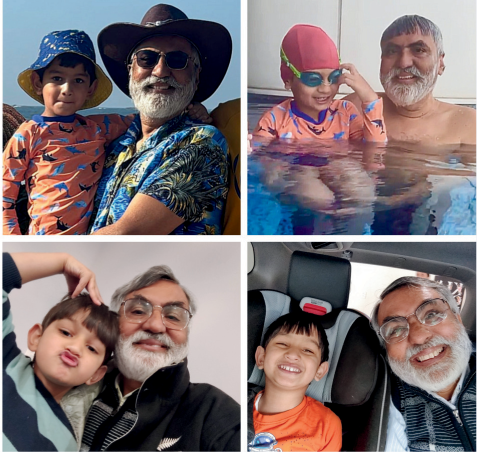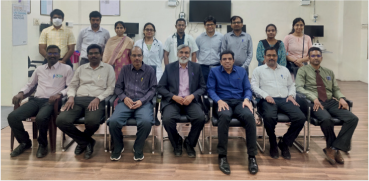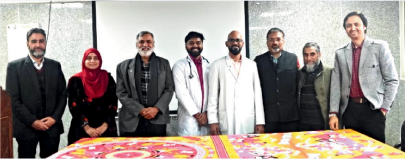Translate this page into:
INTERVIEW WITH DR. PURVISH PARIKH
1 What brings joy to your life?

Joy, happiness and satisfaction are facets of the same feeling. What brings these to me has changed over time. It began with simply being acknowledged for a good deed, all the way to being thanked for being a teacher. When i was a postgraduate student, i was attending an international conference being organized by a “rival” medical institution. A foreign delegate required some assistance, for which i personally took him to the joint organizing secretary. He was shocked, pleasantly surprised and then thankful to me for taking the effort. That gave me a lot of satisfaction for doing the right thing. Decades have passed and now i feel happy when a junior comes to thank me for being a mentor to him, even though we have never met earlier in person. Internet and social media allow me to carry out that without being limited by institutions and geographies. I consider mentorship as my responsibility, and doing that effectively gives me happiness. BUT the real joy i get today is when i am with my 4 year old grandson. The moments that we spend together and “conspire” to do ‘masti’ are priceless. It makes me forget that I am a senior citizen and we turn into two mischievous innocent kids.
| Many years ago Dr Purvish M. Parikh was external examiner for DM Medical Oncology exam for Dr Ramkumar at Medical College, Chennai | Many years ago Dr Purvish M. Parikh was external expert for the appointment of Lecturer in Medical Oncology and Hematology at SKIMS, Srinagar, where Dr Javid was selected for the post |
| Later Dr Ramkumar became Head of dept of Medical Oncology at Govt Medical College, Chennai | Later Dr Javid became Head of dept of Clinical Hematology at SKIMS, Srinagar |
 |
 |
| Dr Parikh was invited by Dr Ramkumar to be external examiner for his DM students at Govt Medical College, Chennai in February 2025 | Dr Parikh was invited by Dr Javid to be external examiner for his DM students at SKIMS, Srinagar in March 2025 |
2 What is your hobby, go to food and favourite movie?
My hobby is resin art and spontaneous creations using my imagination. A coffee table that i put together with the map of Mumbai in resin art is something i am proud of. Another one is the resin art fountain in marble – if you ever come to my home, you will spot it outside our door. Spontaneous creations are part of being a grand-dad. My grandson recently asked me to make a ferry that would carry the paw patrol truck of Rubble. I surprised even myself by making it in 30 minutes using whatever material was available at home. My grandson adored it so much he would keep it under his bed at night. My go to food is onion rawa dosa and filter coffee, especially at Ram Ashraya in Matunga. A close second are samosa from Saurashtra Farsan Mart at Dadar. My favourite movies (across the ages) are The Sound of Music, MacKenna’s Gold and Shooter.

3 What would be one thing you would change if you could go back in time?
Most people would say they don’t want to change anything. Not me. If I could go back in time, I would become judge of the Supreme Court of India. I would then have sufficient power to guide the progress and development of our nation as well as fight the existing injustice that we see in the real world.
4 What was the turning moment in your career as a doctor?
There are two. First was when i was lecturer in Hematology at Seth GS Medical College and KEM Hospital, Mumbai. I realized that i had to break free from the shackles of an under budgeted municipal healthcare facility. After a lot of though, i resigned from a permanent government job and took up the post of a research fellow at Tata Memorial Hospital under Dr SH Advani. That was the best decision of my life. The second one was when i decided to quit my position as head of medical oncology at Tata Memorial Hospital. I realized that all i was doing was fire fighting regarding routine patient management and overcoming human resource conflict. From early morning to late night, i did not have a chance to think. So i put in my resignation (a bold step that was possible only because i had unstinting support from my dear wife). Being a government job, i had to give three months of notice. In those three months i put together a plan to focus on what were the critical unmet needs facing our oncology community – capacity building, mentorship, scientific publications and teaching. Later i added medico-legal aspects, and more recently artificial intelligence, to the list.
5 Why did you choose a career in Oncology?
This was ordained from above. I had a cousin who had thalassaemia major (She is now 50+ years old and one of the longest survivors in India without a transplant). While taking care of her, i got interested in hematology. That is how i chose the path to become lecturer in that subject in the institution from where i did MD in internal medicine. Soon i realized that the neighbouring institute (Tata Memorial Hospital) was the cutting edge center of excellence. Transition to oncology, was therefore a no brainer.
6 What are the key considerations when choosing between working in a private or government healthcare setup?
This is not an either/or choice. Each of them have their pros and cons, as well as could have a place in the career of oncologists. A reputed government healthcare setup, with the right seniors and academic environment, is a good place to establish your reputation. Within a few years moving to the private setup will help get the just rewards that one needs to look after the family. The current focus on healthcare is likely to provide a great opportunity, at least for the next 10 years. Coming together with likeminded colleagues and setting up your own enterprise is the best approach to a productive and fruitful career. Take the initiative, find your area of interest and then become your own boss. There are several instances, outside of a government setup, where colleagues have done world class research and are proud owners of meaningful patents (commercially successful).
7 How do you cope with mental fatigue from constant clinical and academic demands?
It is often said that if you enjoy what you are doing, there is no stress. In addition, one has to devote a specific “me time” on a daily basis. This is not only to relax but also to plan for the long term – without any outside interruptions. Even 30 minutes at the beginning of the day is good enough. Remember, if you don’t plan, you are planning to fail. Clinical and academic excellence is not achieved easily. It requires sacrifice. Each one of us has to find the right balance to avoid burnout (a term i abhor because it implies that the problem is within us. Actually it is a term coined by administrators to avoid taking the blame for their misdeeds).
8 How do you stay updated and avoid feeling overwhelmed by the rapid pace of oncology research?
This is a mental thing. We need to do what we think is important for us. Work smart and work hard. Use the availability of tools to do the work for us. And don’t try to remember everything. Today, all the details are available at our fingertips (literally) by using smartphones and online database repositories. The true challenge is when we fall into the trap of trying to meet the expectations of patients. Instead we have to take charge. We have to lead the way and ensure that patients know their boundaries and respect them.
9 How can oncologists navigate the medicolegal framework to protect themselves?
This is the easiest part actually. Unfortunately most of us do not want to follow what is necessary. Counselling and communication is one key component. However it does not protect against patients wanting to get away from paying the bills or when a colleague is guilty of medical jousting. There comes the importance of systematic documentation. Remember the courts cannot depend on what was the intent of the treating doctor. They need to decide on hard evidence – which is nothing but properly kept medical records. Here again, the use of technology and tools available to us provides a dependent solution. The problem comes when we try to take shortcuts. It is high time we follow defensive medicine.
10 What’s your approach to second opinions when they contradict your own recommendations?
The contradiction is never in real time. What were the circumstances, medical condition of the patient, financial limitations or the choices made by the patient at the time of consulting the previous doctor are never in front of us. When a patient badmouths an earlier doctor, your antenna should be up. We can only recommend one of the standard treatments that we would like to follow in today’s circumstances. That does not mean that what was done earlier is incorrect. Remember, medicine is not mathematics. And no two human beings respond in the same manner when treated identically.
11 One financial advice you would give to resident doctors?
Being financially literate is a very important life lesson. Most of us already have some insights from seeing how the family elders deal with finances as well as how we spent our pocket money. Fundamentally money should not be allowed to become lazy. We have to make a strategy for financial planning leading to independence. Our monthly webinars “Rupee2Sampati” is an effort to educate fellow healthcare professionals on how to do it.
12 One career advice you would give to resident doctors?
There is no such thing as work life balance. Those who talk about it are ones who worked their butts off, became successful and now have the luxury to “teach” other what they never followed. That does not mean that we have to work in a mindless manner. We have to work smart with milestones and timelines. That means we have to make a plan, follow it and make mid-course corrections as circumstances change. The other important advice is teamwork. Likeminded people have a tendency to percolate together. If you surround yourself by colleagues who are positive and energetic, half of your work is already done. Just by talking amongst such a group, will give you insights into what path should be followed. Colleagues also mean those who are reporting to you. Often the peon or the nurse will be the first to provide you with information that you would have otherwise missed. Never underestimate the power of such subordinates. Finally i constantly re-read the book “What got you here, won’t get you there”. I have seen so many successful people making this mistake. Because you are successful and have reached a certain level, does not mean that doing the same thing will take you to the next level. Now you need to develop new skills, methods and strategies to move upwards. Re-invent yourself every 5 years. Look 10 years ahead to decide what you need to do today. Gaining skills in two different verticals will make you indispensible. With artificial intelligence barking at your heels, think how you will make your future secure instead of becoming redundant.





